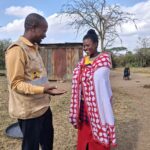By Thuku Kariuki | centapa@gmail.com and Njeri Murigi |healthjournalist3@gmail.com
News that a drug to prevent the transmission of HIV, taken twice a year, has successfully passed a clinical trial in South Africa and Uganda has been greeted with excitement among Kenyan scientists.
Dubbed Lenacapavir (LEN) this is an injectable drug administered every six months to prevent HIV infection. The drug was 100 percent effective after a study in the two countries among different vulnerable populations. It was developed by a pharmaceutical company known as Gilead Sciences.
5300 cisgender young African women and adolescents, between the ages of 16 and 26 were enrolled in the research named PURPOSE 1 trial.
According to Prof Kenneth Ngure of Jomo Kenyatta University, the results are very exciting. He added that LEN offers an additional HIV prevention method that offers choice to end users just like in the field of contraception.
He added that there may be people who will want longer acting products and that is where LEN falls.
On her part, Dr. Elizabeth Irungu from Jhpiego said that the results are both astounding and welcome.
“This is an additional Pre-Exposure Prophylaxis (PrEP) option that individuals can use, providing more choices to those at risk of HIV. Having many options ensures that people can select what best fits their lifestyle, increasing the likelihood of consistent use and better protection against HIV,” she said.
“We hope that access to lenacapavir is quick. That regulatory bodies will do their reviews speedily and that fruitful negotiations between the manufacturer and donors are held to get this highly effective product to those who need it as soon as is feasibly possible,” she added.
A health advocate, Ms Doreen Moraa Moracha, noted that this is a major win for young women as it gives them control to prevent HIV themselves.
“This particular population is among the most vulnerable and carries the highest burden of new HIV infections. Additionally, it also shines a ray of hope toward achieving the global target of ending AIDS as a public health threat by 2030,” she added.
“Having this breakthrough should be greatly celebrated as it shows how much HIV prevention has changed and the investments in research are paying off. As an HIV advocate who also champions a lot for HIV prevention, we are making great progress in the HIV response and I can’t wait to see the prophylaxis drug rolled out for women and girls,” said Moraa.
In Kenya, Pre-Exposure Prophylaxis (PrEP) has become a crucial component of the national HIV prevention strategy. That is why today, PrEP services are integrated into existing healthcare facilities, including public health clinics and private healthcare providers, ensuring accessibility and availability across the country.

The world has welcomed results of a study on a drug for HIV cisgender women and adolescent girls
after it was found out to be 100 per cent efficient in Uganda and South Africa. |Photo Credit: MESHA
Currently, the country has approved daily oral PrEP, which is readily available as well as the dapivirine vaginal ring. The ring was approved for use in Kenya in 2022, following a positive recommendation by the World Health Organization for HIV prevention among women but it is not readily available.
According to the Ministry of Health, 568,279 Kenyans have ever used PrEP Currently 76,346 are currently on the drug since its launch.
Speaking last week at a cross border science media café, Dr. Flavia Matovu Kiwewa, a Ugandan who was one of the principal investigators for the Purpose 1 study said that, the new product is a game changer in the approach to HIV protection worldwide.
“After working for over a decade on HIV PrEP trials, it is extremely fulfilling to get such results. The product was not just effective but was incredibly effective. Not a single infection seen. This is what the world has been waiting for,” she said.
She added that this is the first time researchers have seen zero infections in any study on any product.
The positive result is due to the effectiveness of Lenacapavir, which is already licensed for the treatment of multi-drug resistant HIV. It acts as a salvage regimen, targeting different stages of the HIV life cycle.
The trial tested whether the six-month injection of lenacapavir would provide better protection against HIV infection than two other drugs (Truvada and Descovy), both daily pills. All three medications are pre-exposure prophylaxis drugs.
While previously PrEP medication has been taken orally, a practice which leads to those taking it missing doses when they aren’t paying close attention to their calendars. Having less frequent injectabl medication is seen as a much more effective way to prevent transmission of t disease.
Three more studies will be rolled out in the next year and a half. PURPOSE 2, is already underway in Argentina, Brazil, Mexico, Peru, South Africa, Thailand and the US. The second trial is testing twice-yearly lenacapavir for PrEP among cisgender men who have sexual relations with men, transgender women, transgender men, and gender non-binary people. Results from PURPOSE 2 are expected by early 2025. PURPOSE 3 will focus on cisgender women in the USA, while PURPOSE 4 will study intravenous drug users. At some stage, Gilead Sciences, will present their findings to regulatory agencies, such as the Food and Drug Administration (FDA) in America, for general approval.
Bridget Jjuuko, AVAC’s Regional Advocacy Partnership Manager while speaking at the media café added, “We want to see affordable LEN in the hands of those that need it in the shortest amount of time possible.”
AVAC is looking to mobilize the assistance of civil society organizations, national governments and international donors to make lenacapavir widely available in the shortest amount of time. They hope that lessons learned from the roll out of daily oral PrEP, and more recently the dapivirine vaginal ring and injectable cabotegravir, will help speed regulatory approval and guideline development in key countries. They are rallying various organizations to work together to design effective programs, as well as promoting community understanding of and acceptance of lenacapavir for PrEP.









